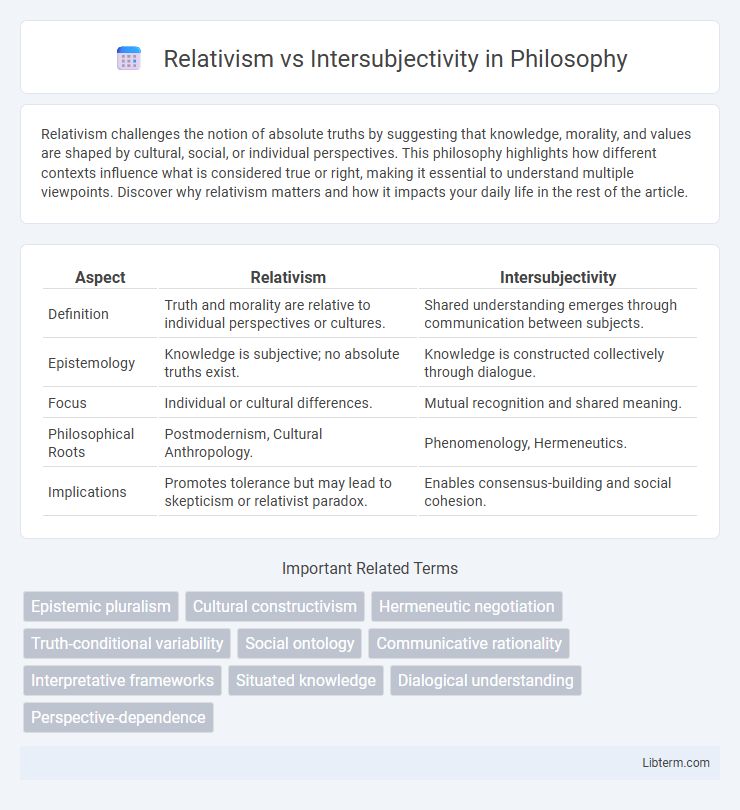Relativism challenges the notion of absolute truths by suggesting that knowledge, morality, and values are shaped by cultural, social, or individual perspectives. This philosophy highlights how different contexts influence what is considered true or right, making it essential to understand multiple viewpoints. Discover why relativism matters and how it impacts your daily life in the rest of the article.
Table of Comparison
| Aspect | Relativism | Intersubjectivity |
|---|---|---|
| Definition | Truth and morality are relative to individual perspectives or cultures. | Shared understanding emerges through communication between subjects. |
| Epistemology | Knowledge is subjective; no absolute truths exist. | Knowledge is constructed collectively through dialogue. |
| Focus | Individual or cultural differences. | Mutual recognition and shared meaning. |
| Philosophical Roots | Postmodernism, Cultural Anthropology. | Phenomenology, Hermeneutics. |
| Implications | Promotes tolerance but may lead to skepticism or relativist paradox. | Enables consensus-building and social cohesion. |
Understanding Relativism: Core Concepts
Relativism emphasizes that truth and moral values vary based on cultural, historical, or personal contexts, rejecting universal or absolute standards. It challenges the idea of objective knowledge by asserting that perspectives are shaped by individuals' or groups' unique experiences and interpretations. Core concepts include cultural relativism, which highlights the diversity of beliefs across societies, and epistemic relativism, which questions the possibility of objective truth in knowledge claims.
Defining Intersubjectivity: A Brief Overview
Intersubjectivity refers to the shared understanding and mutual recognition between individuals, enabling effective communication and cooperation. It emphasizes the co-construction of meaning through dialogue, contrasting with relativism's view that truth varies subjectively across different perspectives. Defining intersubjectivity involves examining how collective cognition and social interactions create common ground beyond isolated individual experiences.
Historical Roots: From Philosophy to Modern Thought
Relativism traces its historical roots to ancient Greek sophists who argued that truth varies with individuals or cultures, influencing modern postmodern philosophy. Intersubjectivity emerged from phenomenology and Husserl's ideas, emphasizing shared understanding as the foundation of knowledge. This transition highlights the shift from subjective relativism to collective meaning-making in contemporary epistemology.
Relativism in Ethics, Culture, and Knowledge
Relativism in ethics posits that moral principles are not universal but vary according to cultural norms and individual perspectives, challenging the existence of absolute moral truths. In cultural contexts, relativism emphasizes understanding and evaluating practices, beliefs, and values based on specific societal standards rather than imposing external judgments. Epistemological relativism highlights that knowledge is influenced by social, historical, and linguistic factors, suggesting that truth is contingent upon diverse worldviews rather than objective reality.
Intersubjectivity and the Construction of Meaning
Intersubjectivity emphasizes the shared understanding constructed through social interactions, where meaning arises from collaborative communication rather than isolated individual perspectives. This approach highlights the co-creation of knowledge, contrasting with relativism's assertion that truth varies solely based on individual or cultural viewpoints. The construction of meaning in intersubjectivity relies on mutual recognition and the negotiation of common ground within a community.
Key Differences Between Relativism and Intersubjectivity
Relativism asserts that truth and moral values vary depending on individual or cultural perspectives, denying any absolute or universal standards. Intersubjectivity emphasizes shared understanding and collective agreement as the basis for meaning, relying on mutual recognition among individuals within a community. The key difference lies in relativism's focus on subjective variance, while intersubjectivity underscores overlapping consensual experiences to establish common grounds of truth.
Relativism Critiques and Limitations
Relativism faces critiques for undermining objective truth by positing that knowledge and moral values are entirely contingent on cultural or individual perspectives, leading to potential ethical nihilism. Its limitations include difficulty in resolving conflicts since all viewpoints are deemed equally valid, which challenges the establishment of universal standards or shared understanding. In contrast, intersubjectivity emphasizes common ground through shared experiences and dialogue, offering a more coherent framework for meaning and truth.
Intersubjectivity in Social Interaction and Communication
Intersubjectivity in social interaction and communication refers to the shared understanding and mutual comprehension that arise through dialogue and engagement between individuals, allowing effective coordination of meaning. Unlike relativism, which posits that truth and knowledge are entirely subjective and vary between cultures or individuals, intersubjectivity emphasizes the co-construction of meaning based on common experiences, language, and social contexts. This dynamic process is fundamental for achieving consensus, empathy, and collaborative problem-solving in social environments.
The Role of Consensus: Shared Understanding vs. Individual Perspectives
Consensus in intersubjectivity emphasizes the development of a shared understanding through collaborative dialogue, enabling participants to align perspectives and establish common meanings. Relativism, however, prioritizes individual perspectives, highlighting that truth and knowledge are subjective and vary according to personal or cultural contexts. The role of consensus thus distinguishes intersubjectivity's collective agreement from relativism's acceptance of divergent, context-specific viewpoints.
Implications for Contemporary Debates and Research
Relativism challenges the notion of absolute truth by asserting that knowledge and morality are context-dependent, influencing contemporary debates on cultural diversity and ethical pluralism. Intersubjectivity emphasizes shared understanding through collective experience and communication, providing a foundation for collaborative research methodologies in social sciences. The interplay between relativism and intersubjectivity shapes discussions on objectivity, truth claims, and the legitimacy of multiple perspectives in interdisciplinary studies.
Relativism Infographic

 libterm.com
libterm.com